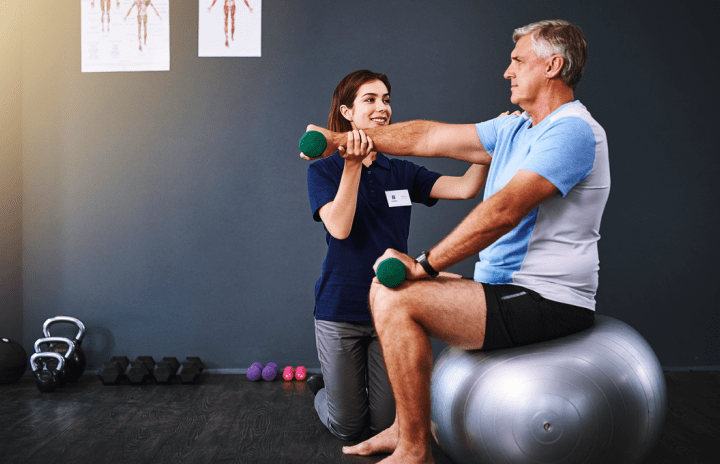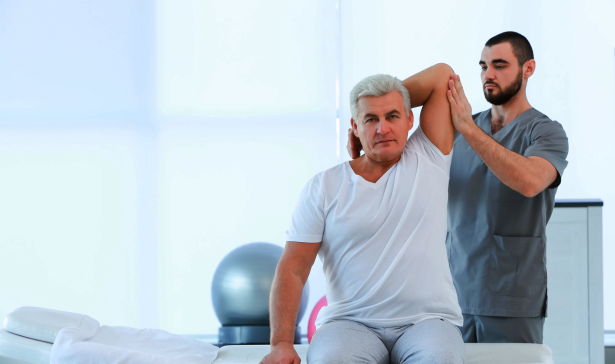Comprehensive Neuro Rehab Services
Explore our wide range of neuro rehab offerings tailored to meet individual needs
Neurological Recovery
Restore movement. Rebuild control. Reclaim confidence.
We use the latest evidence-based techniques and cutting-edge equipment to deliver high-level neurological rehabilitation tailored to your needs.
At West Michigan Neuro & Functional Rehabilitation, we provide advanced, one-on-one neurological therapy for individuals recovering from stroke, brain injury, spinal cord involvement, and those living with progressive neurological conditions. Neurological rehab focuses on retraining the brain and body to work together again through targeted movement, repetition, and neuromuscular strategies.
Whether you're recently injured or managing long-standing deficits, our goal is to restore function, reduce risk, and improve your ability to move, think, and live independently.

Most clients don’t plateau — their therapy does.
The Gap in Standard Neuro Rehabilitation
Traditional rehab often falls short.
Most individuals with stroke, brain injury, or other neurological conditions do not receive the frequency or intensity of therapy needed for optimal recovery. Traditional models are often limited by insurance caps, high caseloads, and protocol-driven care that falls short of what research supports.
At West Michigan Neuro & Functional Rehabilitation, we bridge this gap with a clinic model built around science, not insurance. We offer:
- Longer, more frequent sessions when clinically indicated
- Use of advanced technology and hands-on interventions
- Flexible scheduling and in-home therapy options
- A focus on restorative recovery
Whether you're newly discharged or continuing a long-term journey, our mission is to provide the care, tools, and time you need to move forward.

What We Treat
We work with individuals experiencing a wide range of neurological diagnoses and movement disorders, including:
- Stroke (CVA)
- Traumatic Brain Injury (TBI)
- Parkinson’s Disease
- Multiple Sclerosis (MS)
- Concussion/Post-Concussion Syndrome
- Spinal Cord Injuries (Incomplete)
- Vestibular Dysfunction
- Functional Neurological Disorder (FND)
- Cerebral Palsy (CP)
- Neuropathy (diabetic, compressive, or post-surgical)

Holistic Care
Our Approach to Recovery
At West Michigan Neuro & Functional Rehabilitation, we specialize in neurologically informed therapy that prioritizes restorative recovery over compensation whenever possible. Our model is built on the latest research in neuroplasticity, motor learning, and functional rehabilitation. We emphasize intensity, relevance, advanced technology, and repetition as the foundation for regaining function after neurological injury.
Whether recovering from stroke, traumatic brain injury, or managing a progressive condition like Parkinson’s disease or MS, each client receives a highly personalized plan of care designed to address real-world challenges and maximize long-term outcomes.
Clinically Grounded. Functionally Driven.
Studies have consistently shown that meaningful neurological recovery depends on:
Task-specific, real-life training
High-repetition, high-intensity practice
Minimization of learned non-use
Integration of motor and cognitive demands
Progressive challenge that encourages adaptation
Unfortunately, many clients in traditional outpatient or insurance-restricted systems do not receive the amount, frequency, or type of therapy needed to fully recover. Our model fills that gap.
Techniques That Promote Lasting Neurological Change:
Constraint-Induced Movement Therapy (CIMT)
Proven effective in stroke and brain injury recovery, CIMT encourages use of the affected limb through repetitive, task-focused practice — retraining the brain to improve function rather than compensate.
Task-Oriented Functional Training
Therapy is built around the movements clients need most: transferring from chairs, reaching into cabinets, dressing, walking across varied surfaces — not just generic exercises, but meaningful actions with real-life purpose.
High-Repetition, High-Intensity Motor Practice
Motor learning and neuroplasticity require volume. We structure sessions to deliver hundreds of targeted, quality repetitions while maintaining form, purpose, and safety.
Facilitation and Neuromuscular Re-Education
We use IASTM, facilitated stretching, joint mobilization, and proprioceptive cueing to optimize movement quality and prepare the body for complex functional tasks.
Neuromuscular Electrical Stimulation (NMES)
When appropriate, we incorporate NMES (neuromuscular electrical stimulation) to activate weak or paretic muscles, improve motor control, and enhance functional movement. NMES is particularly useful for post-stroke hemiparesis, spasticity management, and motor retraining after neurological injury.
Mirror Therapy
Mirror therapy is a powerful, low-tech intervention used to retrain the brain's perception of movement and restore motor function—especially after stroke or brain injury. By using the reflection of the unaffected limb, clients can stimulate motor pathways in the affected side, improving coordination, reducing neglect, and in some cases, alleviating phantom limb pain. This technique is particularly effective for upper extremity recovery and re-engaging dormant neural circuits.
Cognitive-Motor Integration
Clients often face cognitive challenges alongside physical ones. Our sessions integrate dual-task training to improve executive function, safety awareness, and memory during movement.
Adaptive Support Without Dependency
We provide adaptive equipment only when it supports independence or safety — and constantly reassess to prevent dependency. Our goal is to restore capacity, not reinforce limitation.
Home Environment & Carryover Strategies
For clients receiving in-home therapy or follow-up support, we offer home environment assessments to remove barriers, recommend modifications, and support safe functional progression.
What the Research Supports
Motor recovery continues well beyond 6–12 months post-injury, particularly with ongoing, high-quality intervention.
Constraint-Induced Movement Therapy (CIMT), high-repetition task practice, and salience-based training consistently show superior outcomes compared to passive modalities or compensatory-only care.
Learned non-use and inactivity are strongly linked to long-term functional decline — especially when affected limbs or systems are underutilized early in recovery.
True neurological recovery is not achieved through substitution, but through retraining and re-engagement of impaired neural networks.
The Goal: Restore Function with Purpose
Every client deserves more than the minimum. At West Michigan Neuro, we are committed to delivering clinically excellent, neurologically sound care that challenges both body and brain to recover — not simply adapt.
Our sessions are designed to help clients regain function, confidence, and control through personalized treatment that is grounded in science, supported by skill, and focused on real-life results.

What You Can Do Now
You don’t have to wait to improve. Here are actionable strategies to support your neurological recovery starting today:
Repetition is essential
Frequent, purposeful practice of everyday movements reinforces neural pathways. Even small actions, done consistently, contribute to long-term progress.
Combine cognitive and physical challenges
Engage both body and brain through activities like walking while naming items or focusing on balance while organizing objects.
Stretch with intent
Gentle, sustained stretches are more effective than bouncing or forced movement. Focus on alignment and breathing throughout.
Use the affected side daily
Incorporate your affected side into routine tasks to prevent learned non-use and encourage balanced recovery.
Optimize your environment
Declutter pathways, use visual cues, and install supports like grab bars to promote independence and safety.
Embrace the process
Recovery is not always linear. Progress may be subtle at times — consistency and effort are what matter most.
